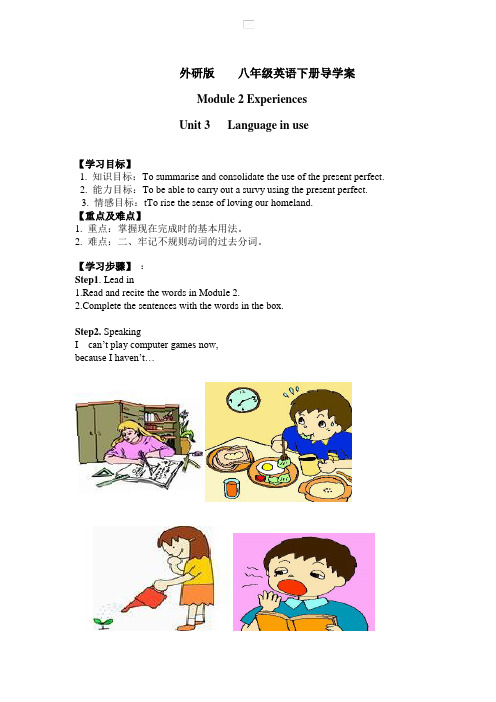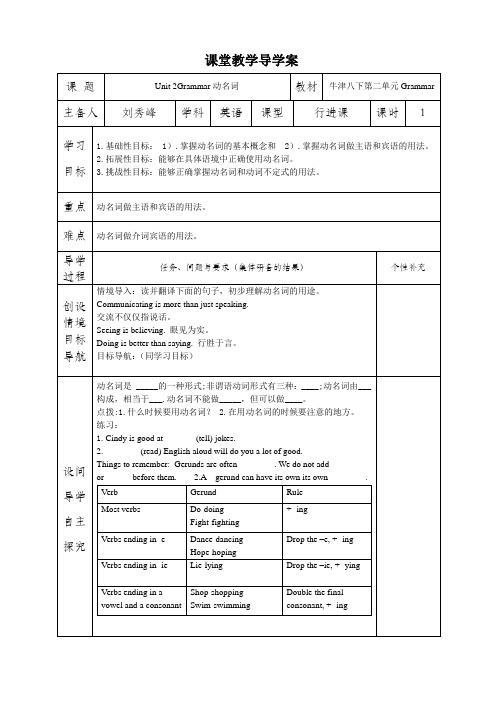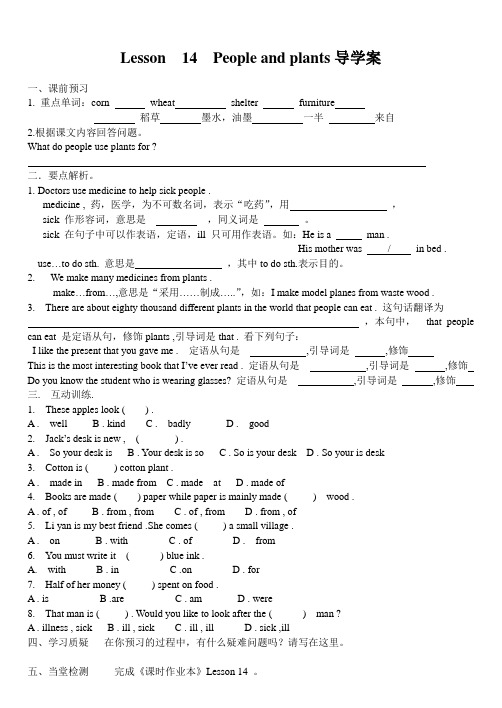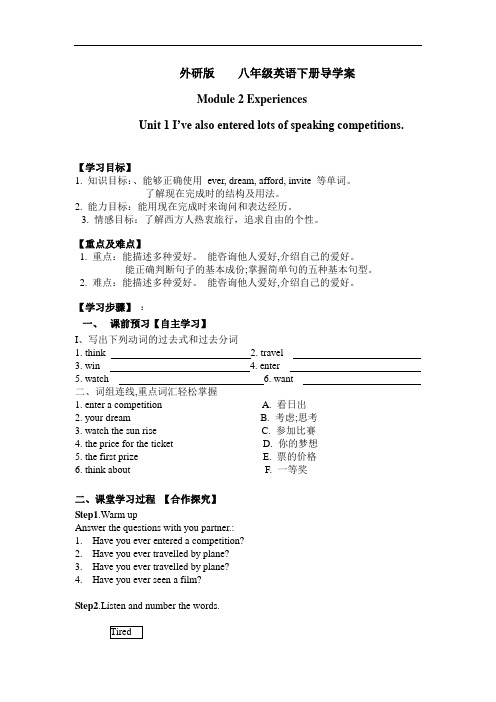八年级下unit2导学案
新外研版八年级英语下册导学案Module 2-Experiences(Unit1-Unit3)

外研版八年级英语下册导学案Module 2 ExperiencesUnit 3 Language in use【学习目标】1. 知识目标:To summarise and consolidate the use of the present perfect.2. 能力目标:To be able to carry out a survy using the present perfect.3. 情感目标:tTo rise the sense of loving our homeland.【重点及难点】1. 重点:掌握现在完成时的基本用法。
2. 难点:二、牢记不规则动词的过去分词。
【学习步骤】:Step1. Lead in1.Read and recite the words in Module2.plete the sentences with the words in the box.Step2. SpeakingI can’t play computer games now,because I haven’t…Step3. Write a questionnaire about your experiences.Have you ever …had a Western meal?lived in another city?entered a singing competition?travelled by train?travelled to the seaside?tried seafood?cooked dinner for your parents?------Yes, I have. / No, I haven’t.Step4 Complete the sentences.1. He/She _____________________ a Western meal.2.He/She ______________________ in another city.3.He/She ______________________ a singing competition.4. He/She _____________________ by train.5.He/She ______________________ the seaside.6.He/She ______________________ seafood.7.He/She ______________________ for his/her parents.Step5. Complete the postcard. Use the list of Things to do in China to help you.Things to do in China!------go to Beijing,see the Beijing Opera,climb the Great Wall,eat Beijing duck,visit the Palace MuseumStep6 Activity4Dear David,I’m having a wonderful time in China. I’ve done so many things!I’ve__________________________________________________________________________________ ___________________________________________________________ There’s only one thing I haven’t don e :I...______________________________________Bye for now,RobStep7. Complete the sentences with the words in the box.afford, competition, pronounce, spell, tower1.I wrote a story for a(n) ___________ in my English class and I won a prize.2.Alice can _______ very well, and what's more, she can write beautifully.3.Some English words are difficult to ____________.4.We visited an ancient palace with a tall_______ and a beautiful garden.5.Mary wants to visit the US, but the plane tickets are very expensive and she cannot ______ to go.Step8.Listen and check (√) the correct answer.Places visitedPeople China Europe USAWinnieDianaBobStep9. Listen again and answer the questions.1. ( ) How many times has Winnie been to the US?A. two timesB. three timesC. four times2. ( ) Where would Diana like to go again?A. the USB. EnglandC. China3. ( ) Which part of China has Diana travelled around?A. NorthB. SouthC. West4. ( ) How did Diana travel there?A. by boatB. by trainC. by plane5. ( ) Has Bob ever visited Germany?A. No, he hasn’tB. Yes, he has【知识结构】(一)、Grammar现在完成时如果你想说“我已经看过某部电影,所以不想看了” “某人曾经做过什么事情”等等,该如何表达呢?首先请看下面的句子:(1)I have seen the f ilm. I don’t want to see it again.(2) Have you ever read a travel brochure?(3) I have never visited the USA.以上句子的谓语动词有一个共同的特点就是“have/has+动词的过去分词”, 用于表示在以前的某个时间曾经做过的、发生的事情,这种行为对目前有某种影响,如(1); 还可以表示到目前为止曾经经历或没经历的事情,如(2)(3)。
八年级下Unit2 SectionB1a-1e, Self Check导学案

Unit2 I’ll help to clean up the city parks.导学案SectionB1a-1e, Self Check (第三课时)学习目标1.进一步掌握谈论提供帮助的句型。
2.听力训练,能听懂所说的动词短语。
学习重点:听力训练,能听懂所说的动词短语。
学习难点:掌握动词短语和动词不定式。
自主先学:1.根据汉语写出下列英语单词或短语并展示.1)与......相像;像_______________ 2)用完,用光_______________3)修理;修补;解决______________4)与……相似_______________5)赠送_______________要点分析:1.repair vt.“修理,修缮”。
如:They are repairing their house.他们正在修缮房屋。
辨析:fix up, repair与mendfix up, repair与mend都有“修理,修补”之意,有时可以通用,但也有区别。
(1)repair和fix都表示使受到一定损坏或失灵的东西恢复其性能或机能,其对象范围很广,从道路、机器到日常用品,如:repair/fix a machine/road(2)mend表示修补破损的东西,使其恢复原样,一般指较小的物品。
如:mend the window/sock2.take after“与(父母)相似”,指由于血缘关系而(在外貌、性格等方面)相似。
如:Tom takes after his father.汤姆像他父亲同义词look like,多指外貌方面相似。
如: Tom looks like his father.汤姆长得像他父亲similar adj.相似的,be similar to与……相似。
如:Cats and tigers have similar features.猫和虎有类似的特征。
A cat is similar to a tiger in many ways.猫和虎有好多方面的相似。
人教新目标八下导学案:Unit 2 I’ll help to clean up the city parks.Section A(2a-2c)

班级:组名:姓名:日期:2014/2/21 编制:八年级英语备课组课题:Unit 2 I’ll help to clean the city parks. Section A(2a-2c)课时:第2课时【学习目标】1.掌握重点单词: sign, notice, lonely.2.掌握重点短语: come up with, put off, hand out, call up, used to, care for.3.掌握重点句型: need to do sth. Let’s do sth.重点:could向他人提建议, 动词短语的区别,角色扮演难点:文中的复会句。
【学习准备】学生:完成预习案。
教师:编制导学案、制作多媒体课件、制作教具等。
【预习案】使用说明&学法指导:1.正确拼读P10单词并牢记;2.预习2a-2c,勾重点短语和句子并翻译;3.熟读2d对话,理解句意。
4. 15分钟独立完成。
I预习导学词汇精粹1.根据汉语意思写单词标志(n.)________ 通知(v.)__________ 孤独的(adj..)___________2. 翻译下列短语和句子1.想出_______2.推迟______3.张贴__________________4.分发____________5.打电话___________6.清洁日________________7.care for ______________ ed to______________ 9.help out_____________3. 自读、小组内互读单词和词组。
【探究案】Step1一群学生正在策划一个城市公园清洁日。
听录音,并勾出他们为告诉人们关于城市清洁日要做的事,完成2a。
(独立完成,自己核对答案,预时2分钟)Step2朗读2b中的句子,再听一遍录音,并填空,完成2b。
(独立完成,2分钟)Step3用2a和2b中的信息编写对话,完成2c。
八下英语 Unit 2Grammar最佳导学案

动名词做主语和宾语的用法。
难点
动名词做介词宾语的用法。
导学过程
任务、问题与要求(集体研备的结果)
个性补充
创设情境目标导航
情境导入:读并翻译下面的句子,初步理解动名词的用途。
Communicating is more than just speaking.
交流不仅仅指说话。
Seeing is believing.眼见为实。
My sister ________ _______ English songs every day.
知识建构
1.什么叫动名词?
2.动名词的构成规则
3.动名词在句子中充当什么成分?
4. 什么时候要用动名词?
总结
反思
Doing is better than saying.行胜于言。
目标导航:(同学习目标)
设问导学自主探究
动名词是_____的一种形式;非谓语动词形式有三种:____;动名词由___构成,相当于___.动名词不能做_____,但可以做____。
旅游是值得的。
教师点拨:
动名词作主语时,有时也可以用it作先行主语,且常与any/no good,any/no use和(not) worth连用。
当堂训练拓展延伸
当堂训练:
完成导学案23页Exercise1的练习
点拨:有些动词,如forget, go on, remember,
stop, try等,后面既可以接动名词,
3. 那个小男孩害怕晚上独自睡觉。
The little boy is _____ _____ ________ alone at night.
4. 在公园野餐真有趣。
___________ a picnic in the park _____ really interesting.
冀教版八年级下 unit2Lesson 14导学案

Lesson 14 People and plants导学案一、课前预习1. 重点单词:corn wheat shelter furniture稻草墨水,油墨一半来自2.根据课文内容回答问题。
What do people use plants for ?二.要点解析。
1. Doctors use medicine to help sick people .medicine , 药,医学,为不可数名词,表示“吃药”,用,sick 作形容词,意思是,同义词是。
sick 在句子中可以作表语,定语,ill 只可用作表语。
如:He is a man .His mother was / in bed . use…to do sth. 意思是,其中to do sth.表示目的。
2. We make many medicines from plants .make…from…,意思是“采用……制成…..”,如:I make model planes from waste wood .3. There are about eighty thousand different plants in the world that people can eat . 这句话翻译为,本句中,that people can eat 是定语从句,修饰plants ,引导词是that . 看下列句子:I like the present that you gave me . 定语从句是,引导词是,修饰This is the most interesting book that I’ve ever read . 定语从句是,引导词是,修饰Do you know the student who is wearing glasses? 定语从句是,引导词是,修饰三. 互动训练.1. These apples look ( ) .A . wellB . kindC . badlyD . good2. Jack’s desk is new , ( ) .A . So your desk isB . Your desk is soC . So is your deskD . So your is desk3. Cotton is ( ) cotton plant .A . made inB . made fromC . made atD . made of4. Books are made ( ) paper while paper is mainly made ( ) wood .A . of , ofB . from , fromC . of , fromD . from , of5. Li yan is my best friend .She comes ( ) a small village .A . onB . withC . ofD . from6. You must write it ( ) blue ink .A. with B . in C .on D . for7. Half of her money ( ) spent on food .A . isB .areC . amD . were8. That man is ( ) . Would you like to look after the ( ) man ?A . illness , sickB . ill , sickC . ill , illD . sick ,ill四、学习质疑在你预习的过程中,有什么疑难问题吗?请写在这里。
外研版英语八年级下册Module 2导学案(3节)

外研版八年级英语下册导学案Module 2 ExperiencesUnit 1 I’ve also entered lots of speaking competitions.【学习目标】1. 知识目标:、能够正确使用ever, dream, afford, invite 等单词。
了解现在完成时的结构及用法。
2. 能力目标:能用现在完成时来询问和表达经历。
3. 情感目标:了解西方人热衷旅行,追求自由的个性。
【重点及难点】1. 重点:能描述多种爱好。
能咨询他人爱好,介绍自己的爱好。
能正确判断句子的基本成份;掌握简单句的五种基本句型。
2. 难点:能描述多种爱好。
能咨询他人爱好,介绍自己的爱好。
【学习步骤】:一、课前预习【自主学习】I、写出下列动词的过去式和过去分词1. think2. travel3. win4. enter5. watch6. want二、词组连线,重点词汇轻松掌握1. enter a competition A. 看日出2. your dream B. 考虑;思考3. watch the sun rise C. 参加比赛4. the price for the ticket D. 你的梦想5. the first prize E. 票的价格6. think about F. 一等奖二、课堂学习过程【合作探究】Step1.Warm upAnswer the questions with you partner.:1. Have you ever entered a competition?2. Have you ever travelled by plane?3. Have you ever travelled by plane?4. Have you ever seen a film?Step2.Listen and number the words.1. Lingling has visited / hasn’t ever visited the US.2. Betty has asked / hasn’t asked her parents.3. Lingling has travelled / hasn’t travelled by plane.Step4. 读对话找出现在完成时的句子。
8年级下册英语导学案Unit2

学校:班级:小组:姓名:小组评价:教师评价:Unit 2 I’ll help to clean up the city parks.第一课时 Section A(1a-1c)【学习目标】1.会使用重点单词cheer,volunteer...,重点短语clean up,cheer up,give out...2.会使用“I could...”、“I hope to...”等句型,向别人提供协助。
3.能听懂、能说出“协助他人,参加社会公益活动”的相关话题。
【学习重难点】1.掌握cheer,volunteer...,clean up,cheer up,give out...的用法。
2.用重要句型向别人提供协助。
【学法指导】1.查词汇表,自学本课时新词汇。
2.朗读1b,勾画有用的表达:clean up,cheer up,give out,at the food bank3.互助学习,练习对话。
【自学互助】一.温故知新:和同伴议一议,讨论回答以下问题。
1.Do you think helping other is great?2.What will you do if you are a volunteer? Please give some examples.二.翻译以下短语。
1.清扫__________2.分发___________3.使快乐;振奋____________________4.sick children________________5.at the food bank__________________6.after-school study program______________________三.通过互助学习后,我的疑惑是_____________________________________________________________________________ 【展示互导】看图说,仔细听,认真评通过观察1a图片中你能够协助人们的方式,然后列出更多其他方式。
2014新人教版八年级英语下unit2复习导学案

Unit2 I’ll help to clean up the city parks【基础必背】一、重点词汇1.V.欢呼____________2.n.通知&v.注意到____________3.adj.孤单的____________ adj.独自,单独的____________4.n.感触 ________v. __________5.n. 愉快_______6.n.长途旅行____________7.n.志愿者v.自愿做____________8. Pron.几个____________ 9.n. 满足___________v.令人满意____________ ;10.n. 物主_______ v.________11.n标志__________12.v.筹集 ____________ 13.v.修理________ = ________ 14.adj.破损的____________ v._________15.n.车轮_________ 16.adj.聋的_________ 17.有残疾的___________ 18.n.困难__________adj.困难的 __________19.想象v __________ n________ 20.n.火车v.训练________ n.__________21. adj.聪明的_______=________23.v.理解__________过去式_________ 24.改变 v.n_______ 25.adj.强壮的_________26.n.兴趣,v使感兴趣____________adj____________ 27.n.信__________ 28.adj.瞎的_________29.adj.激动的___________/_________30. n仁慈________ adj.仁慈的___________二、重点短语1.____________ 打扫干净2.____________ 振奋起来3.____________ 分发4.____________过去···5.____________ 赠送6.____________ 建立7.____________影响 8.____________想出9 .____________迟10.__________张贴11.__________打电话给12.____________帮助···摆脱困难13.____________照顾14.____________放弃15.____________参加选拔,试用16.____________实现17.____________用光18.____________与···相像19.____________修理 20.____________与···相似三、重点句型1.——Can I help you ?——Yes, please./No, thanks/thank you.2.——Would you like me to help you ?——Thank you. That would be nice/ fine.3.——Let me take your bags.——That’s very kind of you, but I can manage it myself.【语法必考】考点一:动词短语动词短语可以分为6种:(1)动词+副词(cheer up ;give out ;put off; get up; start off;turn off )①可以拆分;`②宾语为名词,名词可以在中间,也可以在后面;宾语为代词,代词只能放在中间;例如:政府设立了一个机构来帮助无家可归的人。
- 1、下载文档前请自行甄别文档内容的完整性,平台不提供额外的编辑、内容补充、找答案等附加服务。
- 2、"仅部分预览"的文档,不可在线预览部分如存在完整性等问题,可反馈申请退款(可完整预览的文档不适用该条件!)。
- 3、如文档侵犯您的权益,请联系客服反馈,我们会尽快为您处理(人工客服工作时间:9:00-18:30)。
Book4 of Grade 8 Unit2 导学案学习目标:1.初步掌握单词的读音,词义。
2.初步掌握单词的基本用法。
重点:单词的读音、词义难点:单词的词义预习案使用说明&用法指导 1.预习时,试读每一个单词,在读单词的时候注意词义。
2.完成时间30分钟。
预习unit2单词,完成下列练习题1、打扫(清除)干净_______________2、欢呼_______________3、变得更高兴,振奋起来_______________4、分发,散发_______________5、志愿者;义务做_______________6、想出,提出_______________7、推迟______________ 8、标记,符号,标牌_______________9、通知,公告;注意到_______________ 10、分发_______________11、打电话给…某人,征召_______________ 12、曾经…,过去…_______________ 13、孤独的,寂寞的_______________ 14、照顾,非常喜欢_______________ 15、几个,数个,一些_______________ 16、强壮的,强烈的______________17、感觉,感触_______________ 18、满足,满意_______________19、高兴,愉快_______________ 20、所有者,物主_______________21、参加…选拔,试用_______________ 22、(尤指长途)旅行,行程_______________ 23、抬起,举起,筹集,征集_______________ 24、独自地,孤独地_______________ 25、修理,修补_______________ 26、修理,安装_______________27、赠送,捐赠_______________ 28、外貌或行为)像_______________ 29、破损的,残缺的_______________30、残疾人______________探究案1. You could help clean up the city parks.你可以帮助打扫城市公园。
【解析1】help v →helpful1). help sb. to do sth. 帮助某人做某事。
2). help oneself (to )自用(食物等)。
3). help sb. out 帮助某人克服困难,渡过难关、解决问题、完成工作。
4). with the help of 在……帮助下。
5). help sb. with sth. 帮助某人做某事。
6).Can’t help doing 情不自禁做....【解析2】clean up 把……打扫干净(v. + adv.)clean up the table = clean the table up2. The girl could visit the sick kids in the hospital to cheer them up. 女孩可以去医院看望生病的孩子们,让他们振作起来。
【解析1】sick /ill :(1) sick adj.“生病的”,既可放be (系动词)后作表语,也可放n.前作定语。
be sick of …“讨厌;厌恶……”sick person = patient“病人”(2) ill adj.“生病的”,只能放be (系动词)后作表语,be ill in hospital 生病住院ill → illness n.“病;疾病”①. You look very tired. You must be sick. (= ill)②.He had a sick mother. 他有一位生病的母亲【解析2】in the hospital 与in hospital(1) in the hospital“在医院”指人在医院里,允许是在医院上班,允许是到医院看望病人等;(2)in hospital “在医院;住院” 指生病住院。
类似的短语有:in the bed“在床上”,也许是蹲在床上或站在床上;in bed“在床上”指躺在床上【解析3】cheer up 使振奋,使高兴的(v. +adv)cheer sb. up =make sb. happy 使某人高兴cheer me up 使我高兴3. The boy could give out food at the food bank. 男孩可以在食物站分发食物【解析】give out =hand out分发(v. +adv) hand out bananasgive out sth to sb. 分….给某人4. They told me stories about the past and how things used to be.他们给我讲过去的故事,并告诉我过去事情是什么样子的。
【解析1】(1) use v.使用→useful adj. 有用的use up 用完(2) use sth to do sth 用某物做某事(3) used to do sth 过去常常做某事,表示过去做过的事现在已经不做,只用于过去时态(4) be /get used to doing sth 习惯于做某事(5) be used to do sth 被用来做某事=be used for doing sth【记】He used to wear glasses . But now he is used to wearing contact lenses.他以前常戴(框架)眼镜,但现在习惯戴隐形眼镜。
5. That sounds interesting. 那听起来挺有趣。
【解析】sound n声音We heard a strange sound.【辨析】Sound/noise/voice⑴sound(n.)指自然界中所有的声音,可指悦耳的声音也可指噪音。
⑵noise一般指很响的,刺耳的声音,即喧闹,嘈杂声等。
③voice指人通过发音器官发出的声音(包括说话,唱歌等)。
Mary has a beautiful voice. 玛丽的声音很美。
Don't make such a noise. 别这样大声喧哗。
6. alone / lonely 辨析:(1)alone = by oneself adj. 单独的,指无人陪伴的客观事实,不带感情(2)lonely ①指人孤独的,寂寞的,强调主观感受;②也可指某个地方是荒凉的8. He volunteers at an animal hospital every Saturday morning.他每周六早上在动物医院做志愿者。
【解析】volunteer v 志愿n 志愿者volunteer to do sth 志愿做某9.. However, few people think about what they can do to help others.然而,很少有人会考虑他们能做些什么来帮助他人。
【辨析】however和 but 二者都意为“可是,但是”;⑴ but是并列名词,连接两个并列分句,上下二句在总的意义上构成了对比。
I really don't like cheese, but I will try just a little this time.我实在是不喜欢吃奶酪,但是这次我要尝一点。
⑵ however不能直接连接两个分句,必须另起新句,并用逗号隔开。
It was raining hard. However, we went out to look for the boy.雨下得很大,不过我们还是出去寻找那个孩子10. stop doing(1)stop doing sth 停止做某事Please stop speaking.请停止讲话(2)stop to do sth 停下来去做另外一件事Please stop to talk.请停下来讲话(3)stop sb. from doing sth =keep sb from doing sth=prevent sb from doing sth 阻止某人做某事(4)can’t stop doing sth 忍不住做12. I take after my mother. 我长的像我妈妈。
【解析】take after =be similar to在(外貌、性格等方面)与(父母)相像训练案一、选择填空1. — Mary is so ________—she comes to you whenever you’re in trouble.A. usefulB. carefulC. thankfulD. Helpful2.— My grandfather was ill _____ last week.—I’m sorry to hear that.A. in a hospitalB. in the hospitalC. in hospitalD. in hospitals 3. You could visit _____children in the hospital and _____them______.A. ill, set, upB. sick, clean, upC. sick, cheer, up4. You shouldn’t _____your hope. Everything will betterA. give upB. fix upC. cheer upD. put up5. —Do you ____after your mother or your father?— My father .We both have big eyes and black hair.A. lookB. takeC. run6. My brother used to _____ up late, but now he is used to ___ up early.A. get ;getB. getting; getC. get; gettingD. getting; getting7. The old man lives ___,but he never feels ____.A. alone ;lonelyB. lonely; aloneC. alone; aloneD. lonely; lonely8. . —Dad, why must I stop computer games?—For your health, my boy.A.playB. to playC. to playingD. Playing二、翻译1.这个男孩可以在食品救济站分发食物。
